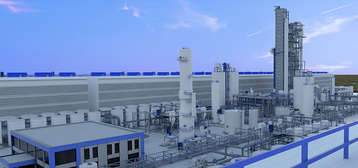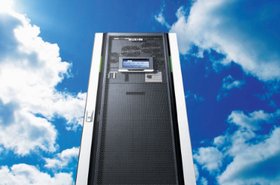Microsoft has signed a carbon capture deal with a direct air capture (DAC) company.
1PointFive this week announced it has entered into an agreement with Microsoft to sell 500,000 metric tons of carbon dioxide removal credits over six years to support the cloud company’s carbon removal strategy.
The credits for Microsoft will be enabled by Stratos, 1PointFive’s first industrial-scale DAC facility currently under construction in Texas. The agreement is reportedly the largest single purchase of carbon dioxide removal credits through DAC to date.
Under the terms of the agreement with Microsoft, the captured carbon dioxide will be stored through subsurface saline sequestration and will not be used to produce oil and gas.
“We are excited about this landmark agreement for direct air capture, which is a result of Microsoft’s leadership in carbon removal and focus on building a more sustainable future,” said Michael Avery, president and general manager of 1PointFive. “A commitment of this magnitude further demonstrates how one of the world’s largest corporations is integrating scalable direct air capture into its net zero strategy.”
“We’re very pleased to announce this deal with 1PointFive, a pioneer in the direct air capture space, which is building the largest DAC project worldwide. To achieve the gigatons of removals needed this century, first-of-a-kind projects like Stratos are essential to move from pilots to scale. DAC plays an important role in Microsoft’s carbon removal portfolio supporting our broader goal of becoming carbon negative by 2030,” said Brian Marrs, senior director for carbon removal and energy at Microsoft.
1PointFive, founded in 2020 and owned by fossil fuel company Occidental Petroleum, was set up to commercialize Carbon Engineering’s DAC technology. In 2023, Carbon Engineering became a wholly-owned subsidiary of Occidental.
With DAC, large fans and sorbent pull carbon out of the air. With 1PointFive's project, the captured carbon is sequestered underground in saline formations.
As well as the Stratos project in Ector County – which is due to launch next year – the company has projects in development in Livingston Parish and Allen Parish, Louisiana; and Chambers County, Texas.
Amazon and Shopify have previously signed up to buy carbon credits from the company.
Microsoft is aiming to be carbon-negative by 2030, and supporting a range of projects in pursuit of this goal. It is signing renewable energy contracts en masse to power its operations, and investing in carbon capture and removal projects as it seeks to remove its historical emissions. However, one company it backed to remove carbon recently closed down.
Microsoft has previously invested in a number of carbon capture projects, including DAC projects from Climeworks, CarbonCapture, and Heirloom.
As well as investing in third parties’ projects, Microsoft, Google, and Meta are all working on their own DAC technologies using waste heat at the data center.
Google parent company Alphabet also has its own DAC project called 280 Earth.
More in Cloud & Hyperscale
-

-

Sponsored Navigating the nexus
-





